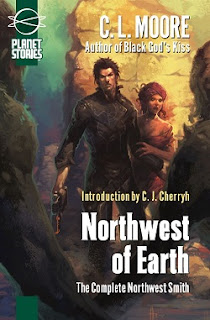Pulp Fiction
Northwest of Earth -- C. L. Moore
When I was a wee lad, my father told me stories of his childhood growing up as the first-born of immigrant parents, in the depths of the Great Depression. One of his greatest pleasures, on the rare occasion when he had a dime in his pocket, was to run down to the local news stand and buy his favorite Pulp magazine, "The Shadow." He told me how the writers for "The Shadow" and the many other Pulps were paid such a low rate per word that they would need to sit banging on their typewriters non-stop to keep from starving. Needless to say, that gave me visions of forests clear-cut to fuel a mountain of shitty, disposable prose. The impression that stuck with me was that genre fiction of the era of the 20s and 30s was something to be avoided.
Still, through the years, I'd read authors I greatly respected talk about how the Pulp mags were full of fabulous writers who inspired them to become authors themselves. I figured their memories, like my Dad's, were colored by fond, rosy-tinted images of those magazines with the lurid covers, filled with swash-buckling tales designed to delight 12 year-old boys.
Fast-forward to 30 years ago, when serious literary types were beginning to heap praise on one of the Kings of the Pulps, Howard Phillips Lovecraft. Lovecraft, like myself, my parents, and my grandparents, was a native of Providence, Rhode Island. Even though I don't enjoy Horror as a genre, I picked up a collection of his stories. But here's what happened. I had read that Lovecraft hated immigrants. Don't know if that's true, but I took it as fact. One of the first stories I read was "Rats in the Wall." It entered my mind that the rats in the tale were allegories for my Irish and Italian immigrant family -- Lovecraft's new neighbors. I dropped that book, and never returned.
Back about 10-15 years ago, the Blog-o-sphere was raving about the three-volume series of Robert E. Howard's complete Conan stories, published by Del Rey / Ballantine. Being a fan of the Sword and Sorcery genre, particularly the darker variety, I decided to take the plunge. Boy, was I blown away. Here was perhaps the quintessential Pulp writer -- but what a writer! Just masterful stuff.
Today, I have a developing respect for Pulp era fiction; or at least, I'm less prejudicial.
Which brings us to the current selection, Northwest of Earth, by C. L. Moore, a compilation published in 2007, as part of the Planet Stories line.
The stories in this collection comprise the complete adventures of the blaster-toting space outlaw Northwest Smith, often accompanied by his Venusian sidekick Yarol. Most were published in Weird Tales, 1933-1938. Set in the far-future, in the Pulp standard solar system featuring the desiccated plains of Mars and the sodden swamps of Venus, both populated by ancient, degenerate semi-human races, separated from humankind eons ago. Smith, a wanted man on three planets, is perpetually struggling to survive while staying one step in front of the law and is forced to take risky jobs from sinister patrons. In the prosecution of these shady capers, he'll become ensnared by powerful eldritch forces.
These are wonderful tales, very well-written, in large part told as the inner dialog of Smith in his desperate struggles while in the grasp of bone-chilling horror. There's also a surprising amount of sexually suggestive material, particularly in the earlier tales. Serves a useful reminder to us of later generations that ours did not invent sex.
The second half of the collection tended to drag a bit; maybe because of an accumulation of my general aversion to the horror genre, but perhaps also due to fact that these tales were churned out in a relatively short period of time and become a bit repetitive. Moore, with bills to pay, no doubt was happy to meet the demands of readers and editor for what had become a successful formula. That said, "Werewoman" (1938), last of the Northwest Smith tales, was one of the most affecting.
If you haven't already, read C. L. Moore, read Robert E. Howard. And I promise to have another go at Lovecraft.



Comments
Post a Comment